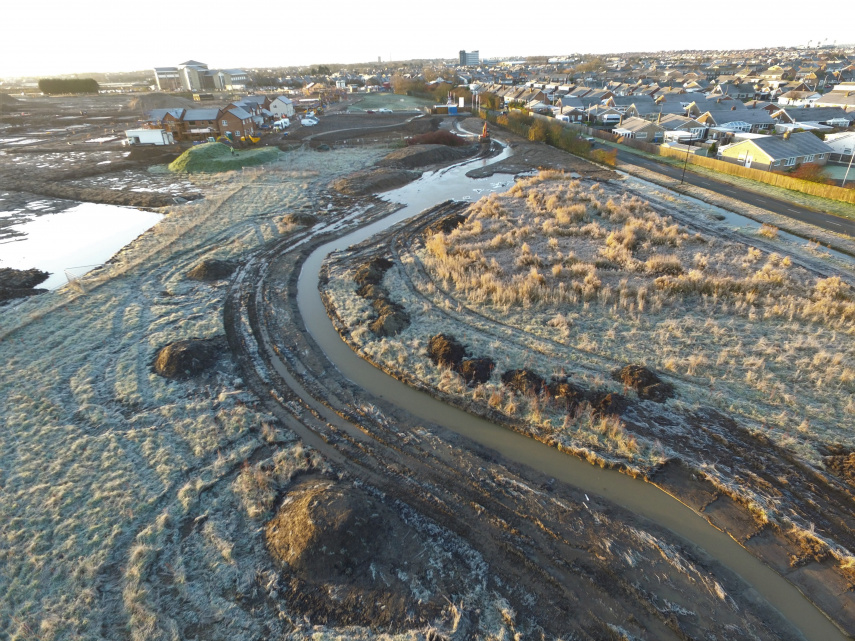Natural Course
Summary
Natural Course is a nine-year EU LIFE Integrated Project that commenced in 2015 with 60% EU grant and 40% match funding. The project is a collaboration between public, private and third sector organisations who are working together to overcome some of the biggest barriers preventing the achievement of ‘good ecological status’ for rivers and water environments in the North West River Basin in England. Natural Course aims to find ways of reaching ecological targets sooner by building capacity, trialling new ways of working together, establishing more joined-up thinking, and exploring innovative sources of funding. Some of the achievements to date include large-scale ecological and environmental improvements, increased and improved access for communities, as well as the reduction of flood risks.
Detailed case study
Natural Course is an EU LIFE Integrated Project with a budget of €20 million, of which 60% is EU grant funding and 40% match funding from private bodies such as United Utilities (UU), and local authorities. The project, which will run for nine years from 2015, is a collaboration between public (the Environment Agency, Greater Manchester Combined Authority, Natural England), private (UU), and third sector organisations (The Rivers Trust). These organisations are working together to overcome some of the biggest barriers preventing the achievement of ‘good ecological status’ under the EU Water Framework Directive for rivers and water environments in the North West River Basin in England. Natural Course aims to find ways of reaching ecological targets sooner by building capacity, trialling new ways of working together, establishing more joined-up thinking, and exploring innovative sources of funding. Some of the achievements to date include large-scale ecological and environmental improvements, increased and improved access for communities as well as the reduction of flood risks.
One of multiple Natural Course projects is the Wyre Natural Flood Management (NFM) project which initiated in 2019. The Wyre catchment suffers from significant flooding which has devastating impacts on local communities. The NFM measures are designed to store, slow, and intercept water, reducing peak flow to flood affected communities in the upper Wyre Catchment. The project is one of four pilot ‘nature-based investment’ projects across England, which aim to test whether and how private investment capital can be blended with public sector funding to finance natural landscape restoration through development of monetisable ecosystem services such as natural flood management, carbon sequestration and biodiversity gain.
The project has successfully secured £650k grant funding from the Woodland Trust and £850k from a nine-year private loan facility. The loan facility will be repaid from buyers of ecosystem services who seek to benefit from the intervention. Farmers and landowners will then be paid to host and maintain the interventions on the ground. As part of the project, the Wyre Catchment Community Interest Company (CIC) has been established as a not-for-profit Special Purpose Vehicle (SPV) that will act as a local legal entity through which capital can flow. The CIC will be limited by guarantee, with an asset lock in place which confirms that any retained profits will be applied for the benefit of communities in the Wyre. The CIC is run by a board of seven voluntary directors which all represent different stakeholders in the project including: buyers, investors, local farmers and communities. Over the next three years, up to 2025, the Wyre Rivers Trust will be contracted by the CIC to deliver a range of capital measures including pond creation, grassland conversion, river restoration and woodland creation. Collectively, these activities aim to reduce peak flow by 5-15% in a one in 50-year flood event, significantly reducing flood risk to Churchtown and downstream communities.
Another Natural Course project is the Cheshire Hub (‘the Hub’) which was set up to run from April 2019 to September 2021. Cheshire Hub Partners include Mersey Rivers Trust, Natural England, UU, and Weaver Gowy Catchment Partnership. The Hub was formed to bring together key organisations and other partners to work collaboratively and develop a joined-up, improved understanding of what was going on in a catchment. By sharing data on the performance of the catchment and water quality sampling, the Hub aimed to identify operational issues, decide on the likely cause and target interventions at the right locations to deliver the greatest benefit. A number of projects within the Hub have provided high quality greenspace for local communities as well as ecological and environmental benefits.
